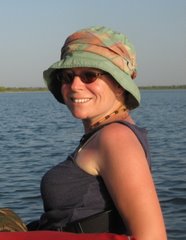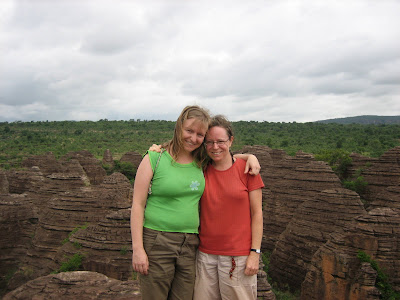I wish I were better at highlighting the good parts of the week... but in my writing - in part because this is my only journal - it often works out that the things i am trying to work out, the things I am frustrated about, are what I talk about in the blog so it sounds more grim than it really is. Let me assure you, there are lots of good things that happen here, small gains and successes, happy moments.
Everyday enroute to and from work I pass 3 elementary schools, and I love the chaos of the healthy kids, running around, yelling, playing with huge white smiles. Its common to see little boys walking along hand in hand, and they look so cute! Its nice to for me to see!! In fact, a good number of the kids on ARVs are really well and resemble those kids... the counsellors tell of before they were on treatment and how they were so ill, so malnourished.
This morning, we had to tell a mother that her and her son are seropositive. Her child is 3, and is severely malnourished, has thrush, and maybe TB. The interns did her HIV test without counselling or consent, so we had to do pre-test counselling, redraw the test and this morning broke the news. The woman had an eerie lack of response, very flat. Based on the history, it seemed she suspected something, as she told us about her husband's girlfriend during the pre-test couselling.
The other day we had 2 seropositive mother who we told that their 18 month olds are negative - which is great. Both mothers took the news calmly, and a few minutes later, burst into tears. Tears of relief and joy, that their child was not infected.
What a busy week. I am really glad my colleagues will be returning over the weekend. I definitely rushed through some things that i would like to have spent more time sorting out, especially with our hospitalized kids.
The funny thing is, some of the feelings of being out of control relate to the system, or lack thereof. On most kids, I have to register them, find their charts, do vitals, draw blood, dispense medications (except ARVs). Even though we do certain things on EVERY child (find chart, weigh & measure the child, get a temperature, count the remaining pills that are left, ask for contact details and look for old CD4 results if its a new kid), the counsellors help only if I ask them explicitly for each task, for each child.
The counsellors get annoyed with us because they want us to just write prescriptions without any information except the last script... but some of the kids end of having had no CD4 counts for >1 year (the standard of care in North America is every 3 months, while the WHO recommends every 6 months at a minimum), some kids have major adherence problems, and many are significantly malnourished but keep coming for refills without having their problems addressed week after week. In the long term, we wouldn't do those kids any favours by just writing a prescription even if it means we might finish earlier.
The families wait in a common waiting area with the kids for general pediatrics consultations, and at least twice a day - today it was 3 or 4 times - we have kids come in, I start asking questions and it becomes clear that they are not for our clinic and then send them away. We don't want to make it too obvious that the toubabs are only looking after HIV infected kids because people may be reluctant to come if that is known widely. They are supposed to come into the room in order of arrival. But the aggressive mothers slip in without waiting their turn. Sometimes there are disputes amongst the mothers about who arrived first and who's turn it is and both today and wednesday we had a yelling match in our doorway. I can think of lots of ideas but either they are not easily implementable or not really acceptable to the counsellors.
We are hoping to renovate a space so that we have more than a 1 room clinic; it seems to be stalled for unknown reasons. But I dream of having a registration desk, a waiting room just for our kids, a room for drugs & procedures, and more than 1 consultation room for 4 physicians. I dream too of having the drugs we need, HIV test kids and the malnutrition supplies we need. At least we have ARVs.
Alas, not in the forseeable future. They are waved under our nose, we get our hopes up, and then they don't materialize. Over and over, for various reasons. I remind myself of the successes (vitamin A!) but there's so much more yet to work on.
 welcoming and put a lot of effort into ensuring that the two 'newbies' - myself and Sarah Kim (another former Pediatrics AIDS Corps doctor) - had a chance to see more of Haiti. (Photo, left to right - Sarah Kim, Jeannine Hatt, Claudy St Juste, Tyler Bloom, Chuck Phelps, Mesa, our driver - lunch stop on our medical tourism day).
welcoming and put a lot of effort into ensuring that the two 'newbies' - myself and Sarah Kim (another former Pediatrics AIDS Corps doctor) - had a chance to see more of Haiti. (Photo, left to right - Sarah Kim, Jeannine Hatt, Claudy St Juste, Tyler Bloom, Chuck Phelps, Mesa, our driver - lunch stop on our medical tourism day).












 When it started pouring rain right at the appointed hour for the party, I was worried that no one would come – rain stops nearly everything in Burkina. In fact, Claire and I had been just about to leave home when the rain started, and as we were all dressed up in our finery we didn’t want to brave the rain and mud of driving there by moto… so had it not been for Bertrand who kindly came and fetched us, we’d have been much later than we were. But our friends braved the rain and the turn out was really good – the 4 counsellors, the 3 Kesho Bora doctors, 2 of the pediatricians, the pharmacist – and of course, Bertrand, Siddiqui and his kids and Amadou. They gave me 3 very nice gifts, and Dr Tamboura – the neonatal ward pediatrician – made a nice little speech.
When it started pouring rain right at the appointed hour for the party, I was worried that no one would come – rain stops nearly everything in Burkina. In fact, Claire and I had been just about to leave home when the rain started, and as we were all dressed up in our finery we didn’t want to brave the rain and mud of driving there by moto… so had it not been for Bertrand who kindly came and fetched us, we’d have been much later than we were. But our friends braved the rain and the turn out was really good – the 4 counsellors, the 3 Kesho Bora doctors, 2 of the pediatricians, the pharmacist – and of course, Bertrand, Siddiqui and his kids and Amadou. They gave me 3 very nice gifts, and Dr Tamboura – the neonatal ward pediatrician – made a nice little speech.





 People live as they have for generations, including brewing millet beer from red sprouted millet seeds in hand-made pots, boiled over a mud brick oven for 3 days before setting down to ferment.
People live as they have for generations, including brewing millet beer from red sprouted millet seeds in hand-made pots, boiled over a mud brick oven for 3 days before setting down to ferment.










 This first photo is taken in the royal compound, of the king of the Gouramance people. I loved the juxtaposition of modern laundry and traditional construction. The small building in the center is a granary.
This first photo is taken in the royal compound, of the king of the Gouramance people. I loved the juxtaposition of modern laundry and traditional construction. The small building in the center is a granary.









